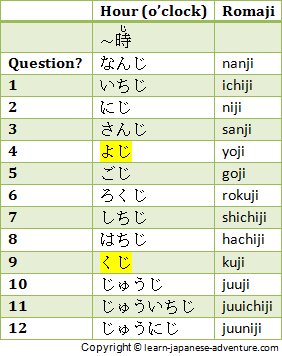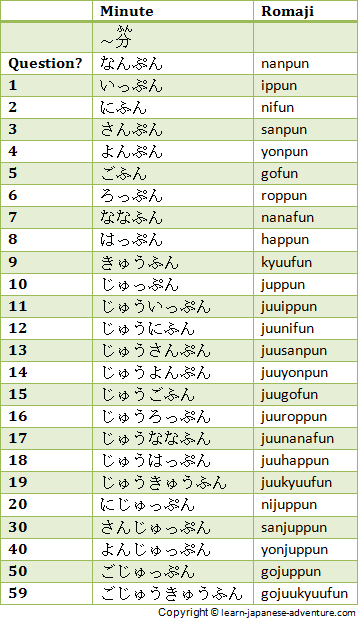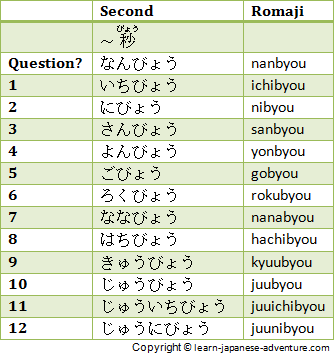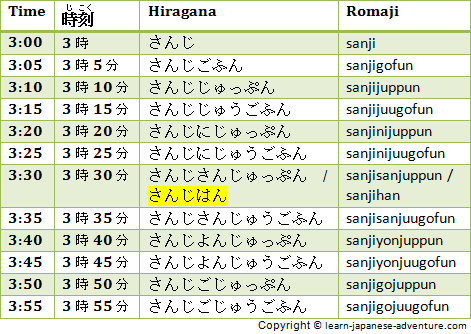- Home
- Japanese Numbers
- Japanese Time
Different Japanese Time Periods
Using Japanese Numbers
Over here you can learn to use Japanese numbers to give Japanese time periods such as hours, minutes and seconds.
It's quite simple to give time in Japanese once you know about Japanese numbers.
To tell the hour in Japanese, you just need to append 時 (ji) to the number.
Similarly, to tell the minute in Japanese, you just need to append 分 (fun or pun depends on different numbers) to the numbers.
Follow the same rule to tell the second in Japanese. Append 秒 (byou) to the number. However most of the time you won't need to give the seconds of the time.
Hour in Japanese
 Japanese Hour
Japanese HourThe table above shows the readings for hours.
Take note of the different pronunciations required for the highlighted hours.
Four o'clock is pronounced as よじ (yoji), not よんじ (yonji). Nine o'clock is pronounced as くじ (kuji), not きゅうじ (kyuuji).
Minute in Japanese
 Japanese Minute
Japanese MinuteThe table above shows the readings for minutes.
Take note of the different pronunciations required for seconds ended with 1, 3, 4, 6, 8 and 10, which are pronounced as pun. The rest are pronounced as fun.
As the pronunciations are the same, the minutes from 21 to 29, 31 to 39, 41 to 49 and 51 to 58 are omitted in the table.
Second in Japanese
 Japanese Second
Japanese SecondTime Expressions in Japanese
 Japanese Time Expressions
Japanese Time ExpressionsThe table above shows the time expressions combining both hours and minutes.
Take note that usually 3:30 is pronounced as 三時半 (sanjihan), instead of 三時三十分 (sanjisanjuppun).
In addition, you need to add 午前 (gozen) in front of the time to indicate am, and 午後 (gogo) to indicate pm. For example,
- 午前8時25分 = 8:25am
- 午後2時50分 = 2:50pm
How to Ask Time in Japanese?
To ask what is the time now, you will normally say
- 今何時ですか。 (ima nanji desu ka)
Meaning: What is the time now?
And the answer for a correct time expression is something like
- 五時四十五分です。 (goji yonjuugofun desu)
Meaning: It's 5:45.
While it is pretty obvious that the time is in the morning or afternoon for both the speaker and listener, 午前 (gozen) and 午後 (gogo) are not normally not used during a dialogue.
Best Deal of the Year! Get 68% OFF Lifetime Premium! Ends on 13 Dec 2025
Click Here to Get 68% OFF Lifetime Premium and be on the fast track to fluency in Japanese.
The link above is an affiliate link, which means that I would earn a commission (at no extra cost to you) if you do end up purchasing the related learning course.
Buy me a coffee









Facebook Comments
Don’t see the comments box? Log in to your Facebook account, give Facebook consent, then return to this page and refresh it.